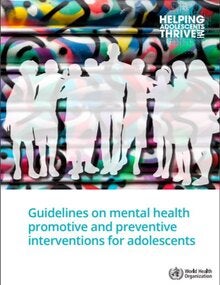Guidelines on mental health promotive and preventive interventions for adolescents: helping adolescents thrive

|
OverviewThese Guidelines on promotive and preventive mental health interventions for adolescents: helping adolescent thrive (HAT guidelines) provide evidence-informed recommendations on psychosocial interventions to promote positive mental health and prevent mental disorders among adolescents. These guidelines, the UNICEF/WHO HAT toolkit and other related implementation tools aim to support evidence-informed programming to achieve that goal. The HAT guidelines have been prioritized by WHO as one of its global public goods for health. The guidelines are based on evidence from studies of interventions delivered to 10–19 year-olds, with particular attention to:
In reviewing the evidence, the primary outcomes of interest were improved well-being and functioning, reduced symptoms and incidences of mental disorders, and reduction in self-harm among adolescents. Other outcomes of interest included reduced risky behaviours (substance use and aggression), improved school retention, and healthier sexual and reproductive behaviours. Related documents
Executive summaries in other languages: |
